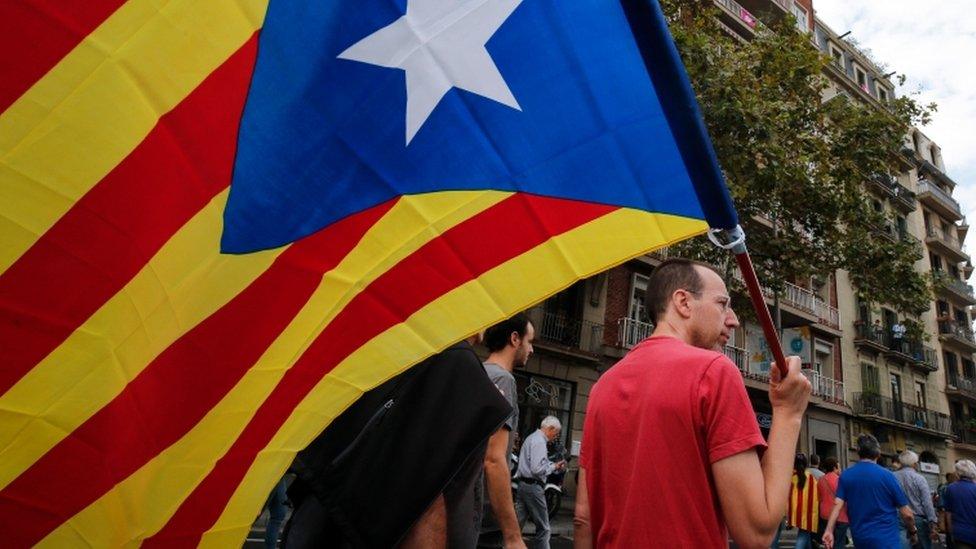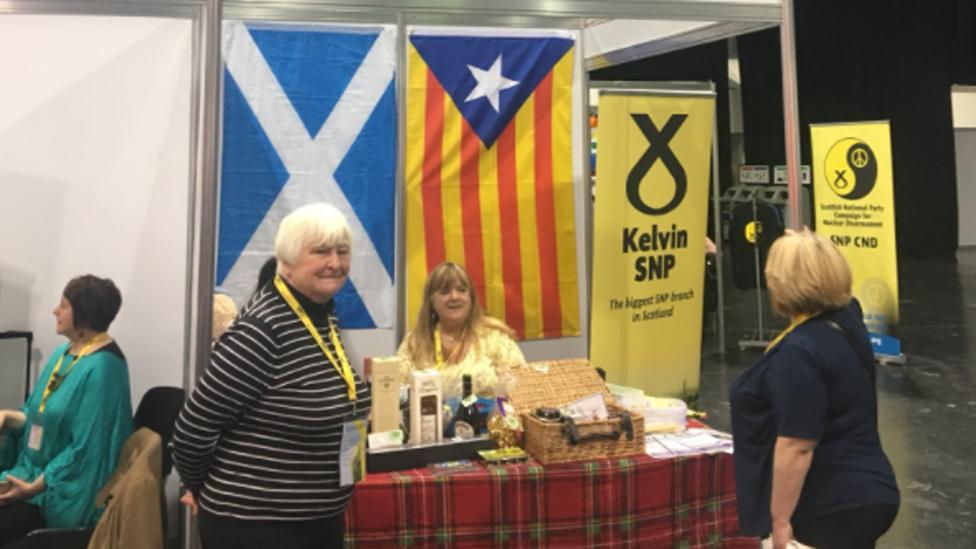SNP urges Spain to 'respect' Catalan vote
- Published

Independence was backed by 90% of those who voted in the referendum, but turnout was only 43% after the vote was ruled to have been illegal
The SNP has urged Spain to "respect" the overwhelming pro-independence vote in the disputed Catalan referendum.
A motion passed unanimously at the party's conference called for international mediators to help find an "agreed solution" to the crisis.
There were cheers and loud applause for a Catalan government delegation after it was introduced at the conference.
SNP leader Nicola Sturgeon said earlier that it was "not for me to say whether Catalonia should be independent".
And while the motion describes the referendum as an "expression of the democratic will of the people of Catalonia", it does not explicitly say that region should now become independent as a result.
The referendum on 1 October was said by the Catalan government to have resulted in a 90% vote in favour of independence.
Nicola Sturgeon condemns violence against Catalan voters
But turnout in the referendum, which was ruled illegal by the Spanish courts, was put at just 43% after it was largely boycotted by those who want to remain part of Spain.
There has been speculation that the Catalan government will attempt to declare independence in the coming days.
But the French government has already said it would not recognise Catalonia as an independent state, and that any such move would mean expulsion from the EU.
Voters in Catalonia explain why their reasons for backing or rejecting independence
The motion passed by the SNP conference acknowledges that the Catalan and Spanish governments are "perfectly entitled to take positions for and against independence".
But it expresses concern that any state would "seek to deny people's right to democratically express their will" and condemns the violent attempts by Spanish police to stop the referendum going ahead.
The motion holds up the Edinburgh Agreement between the Scottish and UK governments, which paved the way for Scotland's legally-binding independence referendum in 2014, as a "shining example".
And it calls upon the Spanish government to "respect the overwhelming 'si' vote won in the Catalan referendum as an expression of the democratic will of the people of Catalonia" and urges the UN, EU and Council of Europe to mediate.
The Scottish and Catalan independence campaigns have enjoyed close links since the Scottish referendum.
Several leading SNP figures travelled to Barcelona ahead of last week's vote, and there is overwhelming sympathy for the Catalan cause among the party's elected politicians and grassroots members.


Analysis by Philip Sim, BBC Scotland political reporter
Catalonia is difficult to escape at the SNP conference - before you even enter the venue there are Catalan flags flying.
Inside too they are fairly ubiquitous, bedecking exhibition stalls, T-shirts and leaflets. The referendum, and resulting police crackdown, is a hot topic of conversation around the food stalls.
And yet the issue is a tricky one for the party's leadership. They are caught between sympathy for the cause of independence, and desire for a recognised and legitimate process (like, say, the Edinburgh Agreement).
Were Catalonia to unilaterally declare independence during the SNP's gathering, it would surely spark a clamour among activists either to recognise the new state, or from some to even plot a similar move.
There has also been a knock-on effect on attitudes towards the EU. The EU's silence over the violent scenes during the contested vote prompted some - including former Presiding Officer Tricia Marwick - to renounce their former backing for membership.
Mike Russell reflected the mood of many party activists when he noted in the very first debate of the conference that the EU is "not good in a crisis" - before stressing the more familiar party line, of wanting "independence within the EU".

Ms Sturgeon was widely praised for her swift condemnation of the police violence that left hundreds of people injured as they attempted to vote.
But she has stopped short of endorsing the result of the referendum, and has avoided saying whether she would recognise Catalonia should it declare independence.
Speaking to the BBC ahead of the motion being debated at her party's conference, Ms Sturgeon said: "I didn't ever really take kindly to people trying to interfere with whether Scotland should become independent, and it is not for me to say whether Catalonia should be independent."
Ms Sturgeon added: "The people of Catalonia should be able to decide their own future, so if that referendum was illegal, which is Spain's position and I respect that, the question is how do people legally and legitimately express their view?"
She called for dialogue to replace confrontation, and for a way forward to be found that "respects the rule of law, which is vital, respects democracy but also respects the right of people in Catalonia to determine their own future".
On her own plans for a possible second independence referendum in Scotland, Ms Sturgeon insisted she "would not want or choose to go down the road" of holding another vote without a legal agreement in place between London and Edinburgh.